| |
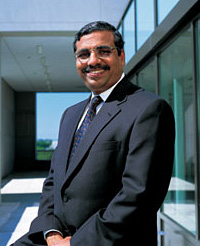 |
| |
�2001
Kellogg World/Thom Duncan
Dean
Jain on the 6th floor balcony of the newly completed
Jacobs Center
|
| |
|
Transition
at the top
Dipak
C. Jain becomes the Kellogg school's 11th dean. He explains
how his leadership will balance continuity with change to
build Kellogg's brand.
by
Matt Golosinski
Kellogg's
new dean, Dipak Jain, cannot escape the telephone this afternoon
in the lobby of the James L. Allen Center. A quick call to
his assistant leads to a second conversation. As soon as that
call concludes, Jain punches in another set of numbers, then
another, launching a sequence that ends 20 minutes later.
These calls are all business and Jain handles them deftly,
but with the congeniality that marks the dean's gracious demeanor
toward everyone, regardless of rank. In the crush of media
surrounding his July 1 appointment as Kellogg's top administrator,
Jain has found himself at the center of international attention.
Even under normal circumstances, though, the 43-year-old marketing
professor is a walking network hub, and it's obvious that
people enjoy talking to him as much as he enjoys talking to
them.
Generally
reserved, Jain grows more animated when swept away by his
passion for Kellogg or for his research -- strategic and new
product marketing among his specialties. The dean possesses
a wry sense of humor and enjoys telling a good story. When
he accents his conversation with a philosophical aphorism,
the move seems perfectly natural.
Jain smiles
easily. He retains his poise even amid the flurry of obligations
that press their way onto his crammed calendar. The smile,
however, should not be misinterpreted as a nonchalant management
style. Jain's good humor exists despite the schedule he maintains,
a pace that's been relentless over the last half-decade of
a 16-year tenure at Kellogg while he served as the school's
associate dean for academic affairs. During this time, Jain
worked closely with former dean Donald P. Jacobs. The two
men share certain traits, not the least of which is that each
is an indefatigable, jet-setting ambassador for Kellogg. Pass
Jain in the hallway on a given afternoon and ask him what
he's doing that day and the response may be a casual "Going
to Germany," as if he were headed to the local library.
A scholar
of international reputation, Jain has written numerous articles
and is on the editorial board of several prestigious peer-reviewed
journals. He serves as a consultant to some of the world's
premier corporations, including Motorola, Eli Lilly and Microsoft,
and has also been awarded or nominated for 21 teaching awards.
Kellogg
World interviewed Dean Jain about his vision of the school's
future. In the process, we discovered that his rise through
the Kellogg ranks proves the opposite of Leo Durocher's famous
maxim: Nice guys -- with talent and dedication -- finish first.
| |
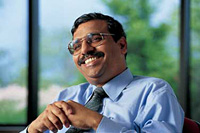 |
| |
© Nathan Mandell
Dean Dipak Jain
|
| |
|
Kellogg
World: How does it feel to be named dean of Kellogg?
Dipak
Jain: I'm deeply honored to have been selected to lead this
prestigious school. Kellogg has outstanding faculty, students,
alumni, administration and corporate support.
What
do you see as your biggest challenge as you assume the deanship,
and how do you intend to meet this challenge?
The biggest
challenge is building on the reputation of Kellogg. This is
not a place where things are broken and I have to fix them.
The school is in great condition. It's important for me to
make sure that things continue in this way, but at the same
time we have to assess what we can do differently to build
on what we have already achieved.
That's
an interesting challenge. You want to innovate but without
doing violence to those aspects of the institution that work
so well.
Yes. A
big challenge is to continue the Kellogg school's culture
of change and continuous innovation.
Share
your ideas on how you want to pursue this goal. What are some
of the agenda items that are likely to cross your desk as
you begin your tenure?
I really
want to focus on the Kellogg brand. I want to continue to
enhance Kellogg's image worldwide. Dean Jacobs has taken a
lot of strategic initiatives in that direction. My job will
be to build on those initiatives and also identify other areas
where we think Kellogg can really create great impact. But
first, it's very important for me to do an internal audit
on the resources we have. I need to know what is on my plate,
what demands are on me and what my resources are to meet those
demands. Once I have this analysis, I will know what I can
do further. We are taking an analytical approach.
What
do you see as the source of Kellogg's strength in the marketplace?
We have
a very entrepreneurial style of doing things at Kellogg. That
is a great asset. If you look at major corporations today,
what are these corporations shooting for? How they can build
an entrepreneurial culture within large organizations.
That
seems almost paradoxical.
Paradoxical,
or some people would say it's an oxymoron. 'What do you mean
by large corporations being entrepreneurial?' Entrepreneurship
doesn't mean that everyone starts a new business. It means
that people should have the motivation to come up with new
initiatives, and then the system should be able to push those
initiatives rather than create problems. Kellogg is blessed
with the kind of environment where students, faculty and staff
can propose new initiatives and, after a short period of due
diligence, have those initiatives implemented.
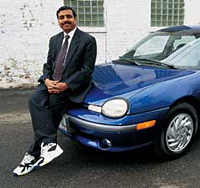 |
|
| Dean
Jain in a 1994 Kellogg World story about his course on
new-product development strategies including the Plymouth
Neon and Reebok's Pump shoe. |
|
| |
|
So
there's a structure here that's not so rigid and rigorous
that it pushes away good ideas that might arise from an entrepreneurial
spirit.
Exactly.
In fact, the culture at the Kellogg school fosters innovation.
That is one strength. The second strength that Kellogg has
is this concept of community feeling among students, among
staff, among faculty -- and that's a great asset.
Do
you think this culture is fairly rare at this level of graduate
education?
Yes. It's
not easy to create. Our students are a wonderful asset, and
we will continue working closely with them to obtain their
input on initiatives. The third strength that we have is resources
and location. Kellogg's facilities provide the infrastructure
to impress and impact many students and executives. That is
a real benefit. How many schools in the country have a facility
like the Allen Center? Or, for that matter, this natural setting
along Lake Michigan? It's a beautiful location and Chicago
is a beautiful city.
What
about Kellogg's synergy within the larger university? How
does this affect the business school?
Our relationship
with Northwestern is absolutely phenomenal. The provost, the
president, the entire senior staff are all behind Kellogg,
and that is the key for us to get things done. So our strength
lies not only within Kellogg, but across other schools within
the university. Let me tell you, in life, for you to do anything,
you have to create an environment where people perceive win-win
situations, and it is doable if the intention of both parties
are clear.
It's
a matter of framing the discourse in such a way so that participants
can appreciate a common goal.
Absolutely.
It's more than an individual goal; we look at what's good
for the Kellogg school and for Northwestern University.
What's
good for Kellogg is good for the university, and vice-versa?
Exactly,
and good for the people associated with the Kellogg school.
You see, if Kellogg's reputation goes up, all of us feel good
and our market value goes up.
Is
there an area in the school or among its initiatives that
you'd like to bolster?
We will
have a more proactive approach to building alumni relationships.
We must ask ourselves whether we are doing everything possible
for our alumni. We'll also identify new sources of differentiation
for Kellogg. We started this thing called 'team-building.'
Now everyone is doing that. The term has become common vocabulary.
A good
idea, but perhaps one that now seems more of a generic concept?
More generic.
If I mention teamwork, people will say 'Oh, he's talking in
stereotypes.' We have to work on differentiating ourselves,
not only from peer institutions but from ourselves, from what
we have done in the past so we can determine where we go next.
We also need to build the academic reputation of Kellogg,
which means we need to identify new research areas where we
can create more attractive research and have our faculty write
books and articles that enhance our reputation.
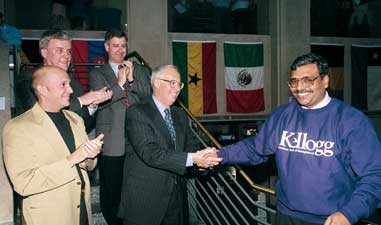 |
|
©2001
Kellogg/Thom Duncan
Northwestern
University President Henry Bienen introduces Dipak Jain
as the future dean of the Kellogg school. Joining in
the May event were (back row left to right) Provost
Lawrence Dumas and Professor David Besanko, who headed
the dean's search committee, and student search representative
Brian Poger '01.
|
Let's
return to the issue of enhancing the school's relationship
with its alums. What can Kellogg do differently in this area
to build value for alumni?
First
of all, we need a better communications system to keep them
informed about the initiatives we've taken. Second, we need
to get the alumni involved in these initiatives. They should
not be told what's [already] happened, but they should be
part of the initiative-driving process. Third, we need to
find out what kind of programs we can have that would create
interest in the alumni so that they come forward and participate
fully.
So
Kellogg is soliciting from alumni what the graduates would
like to see in terms of outreach and programming?
Exactly. We're creating a 'pull' as opposed to a 'push' strategy,
asking ourselves what would attract alums. I also believe
that one way to create pull may be to enhance some of the
things that these alumni have seen while they were here.
Tailoring
the school's initiatives to their real-world lives today?
Yes. Like
our creating the 'MBA Update' program. The most important
thing is that whatever we do has to have an academic component
-- but academics tied to corporate impact.
Do
you wish to emphasize the link between the theoretical and
the practical?
The things
we do for alumni should have a combination of what I call
rigor plus relevance. Why would an alum come back to listen
to what I have to say unless I can show them this information
is being used by IBM, for example, to do their work? They
need to be able to relate to those concepts. That is the key.
Are there any other keys worth considering? We need to create
some new centers of excellence, like we have done in the direction
of biotechnology. I honestly believe that we have somewhat
exaggerated the high-tech side of things, and now we need
to incorporate new centers or areas of high-touch.'
High-touch?
Explain that.
Focus
more on the person, or what we call people skills. Because,
at the end of the day, we are still human beings. One can
teach you all the analytical skills, but you have to be a
people person to fully implement them. However, if you're
a nice person without the ability --[shrugs]. A foolish friend
is worse than a wise enemy. So people have to be smart --
that's an essential condition -- but in addition to being
smart, you have to have more people skills too.
How
would you sum up your philosophy of education?
Education
is a continuous process. It's not something that ends. For
me, education not only makes you more informed, it also makes
you a better person. What is education at Kellogg? Education
here doesn't just mean being in the classroom. When people
come here to pursue their MBA, they are not only taught in
the classroom, but all the group work and extracurricular
activities students get involved with help them develop a
better personality. My view of education goes beyond learning
the specific tools and business concepts. It involves making
you a total, well-rounded person.
What
you're saying suggests the original Latin sense of the word
education: to draw potential out of yourself. Then, of course,
there's the Renaissance ideal.
Absolutely,
but there is one more thing that as a professor I need to
do at the same time: I need to make sure that students harness
their inner skills.
One
person, one teacher alone, probably can't do this. You enlist
the services and synergies of an entire academic community.
Yes. That
is a foundation of the Kellogg culture.
What
about your philosophy of management? How do you approach running
an institution like Kellogg?
My concept
of leadership is one of inclusivity. I don't run alone; we
all work collectively. I don't believe in a hierarchical structure,
but I do believe in accountability and responsibility. I'm
a big believer that we all are here to work together for one
common goal. That is, making sure that the Kellogg school
continues to flourish and grow.
Can
you cite any early formative experiences that helped shape
these philosophies and who you are today?
I have
always believed in life that you don't really know initially
what is good or bad. What you know is what you get through
your environment. You should do the best you can given your
skills and the opportunities offered to you. I have never
believed in this concept of optimization. I believe that we
perform a task in a manner such that the person assigning
it next time gives us a much stronger responsibility. I've
always believed that you should not be so focused on the outcome.
Outcome is the sight; the process to reach the outcome is
the insight. That's where the reality is.
There's
a Buddhist element to this perspective. Zen Buddhism in particular
values the process over the product, telling us that we should
attend to the details of what we're doing now, at this moment,
rather than jumping ahead to the outcome. The future doesn't
really exist in the way many of us believe.
That is
my honest belief. Exactly. This way we make sure we know where
the potholes are along the path. I've also always believed
that I am what I am. So I have to believe in myself. I know
myself better than others, so I have to be self-critical.
At the same time, if people know things about me that I don't
see, I should be focused on them. I've always believed that
when people tell me something about myself, even if it's not
the thing I'd best like to hear, I should pay attention because
that person's criticism has a good intention. In life, clarity
of intentions is what matters the most.
To
adopt this perspective would seem to require a profound sense
of self-regard -- not in an arrogant sense, but in the sense
of strong self-confidence.
I am Indian.
I may have an American passport, but that doesn't change who
I am. Some may find this strange, but I've always believed
that if you are what you are, then you can add more richness
to a group than if you tried to become one of the group at
the expense of your own personality. The diversity that I
bring to the group because of my background should be a positive
sign rather than a negative. People say 'behave in Rome as
the Romans do.' I think you should behave in Rome as yourself,
but do something that the Romans find appealing and not offensive.
Teach the Romans something, or at least have them say 'let's
see what this guy is doing.'²
Then
the community may incorporate your way, your perspective,
into how they act. They might learn something new from you,
and vice-versa.
Yes. At
every stage in life you should have a learning mindset. Even
after a dinner conversation you should walk away feeling that
you've learned something. 'I didn't know the health benefits
of vegetarianism or of chili peppers.' That sort of thing.
You should be able to contribute value to the conversation
so that others learn and you too can learn something.
| |
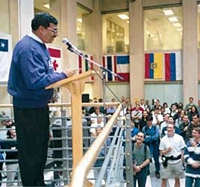 |
| |
©2001
Kellogg/Thom Duncan
After
his announcement, Jain addressed students, faculty and
staff in the Levy Atrium.
|
| |
|
Though
you're just beginning your tenure as dean, can you look ahead
and give us an overall snapshot of your aspirations in this
new role?
I would
like for people to say 'I learned something valuable and it
was good to work with Dipak Jain.'
There
are some people who might tell you that assuming the deanship
at Kellogg after Dean Jacobs is a daunting task. What's your
response?
I say
that this circumstance is an honorable burden. Yes, it's difficult
to follow him, but I also got my training under him. The last
five years working with him have been very valuable for me.
I know his likes and dislikes, but at the same time if I continue
to do what he has done, that is not right. Then I'm not being
myself.
That's
a real challenge, because here's a guy who, for his time and
place, did some incredible things, but you still want to differentiate
yourself from him.
I don't
want to differentiate just for differentiation's sake. I want
to make sure that the right initiatives are taken and that
we all work to take Kellogg where it should be. Then take
new initiatives that are not deliberately opposed to what
Jacobs did, but to build a whole portfolio of new ideas too,
where there is synergy in the system. There are a lot of things
we can do. I've always believed that the biases of any individual
should serve as the source of insight for success. Why does
a person hold certain biases, and what can I do with those
biases? Times change and people change. There are some things
I may choose to approach differently than Jacobs, but it's
not that I'm going against him. He was right at that time;
I may be right at this time.
You've
been well regarded in the classroom as a teacher, a professor
whom students admire and benefit from.
[deadpan]
You have been misinformed.
[laughs]
Talk about some of the similarities and differences between
that role -- and the skills it demands -- and the role as
chief administrator and the set of skills that come into play
for you to be a good dean.
The first
thing is, to be a good teacher you need to love teaching.
In all things in life, the most important thing a person wears
is his or her expression. You can wear a nice suit, but the
expression on your face is what has the most impact. If I
am a good teacher and have passion for teaching, the same
passion should come to bear when I'm dealing with people or
situations associated with the school's administration. You
have to show others that you love doing what you're doing.
If you treat certain aspects of your work as the cost of doing
the job, you won't be successful.
By
'certain aspects' do you mean those components of daily work
that may not offer one a full degree of excitement or pleasure,
yet still must be addressed?
Yes. You're
not going to like everything you do, but it's all part of
the job. For instance, it's very difficult to tell a professor
that he or she did not get tenure at the Kellogg school, even
if it is the appropriate decision for all parties.
We
inhabit all these various social roles we assume, but it all
comes down to acting out of our genuine nature for the best
of the community, and for the best in a particular situation.
Yes. I
don't believe there is a single 'right' or 'wrong.' Everything
can be right under one condition and be wrong under another.
I believe in multiplicity of viewpoints.
One
of your endearing qualities is your sense of humor. You take
your work very seriously, yet you don't appear to get caught
up in personal ego to the point that you take yourself overly
seriously. I recall you telling a couple humorous stories
about your early days at Kellogg -- including an initial encounter
with Don Jacobs that left something to be desired.
[laughs]
Oh, yes. I used to participate in many activities at Kellogg.
My very first year here there was an alumni reunion weekend
-- as we have each May. Don saw me at the Allen Center during
one of the activities and got very angry. He was mad! He said
that this is not the place for us [as junior faculty members].
We should be teaching and doing research, and not eating dinners
at the Allen Center. He knew I was on the faculty but he didn't
know my name since I was hired while he was out of town. I
always believed that's why I got the job.
A rather
inauspicious start to your Kellogg career, but things turned
out OK.
I never
thought that the same man who was so angry at me then would,
in June of 1996, make a very strange phone call in the middle
of the night to me. I was at Columbia University at a marketing
seminar. I was asleep when the call came at 12:35 a.m. I picked
up the phone and said 'Sushant (my wife), what's wrong with
the children?' A voice said 'This is not Sushant. This is
Dean Jacobs. I want to make an announcement at the Oh Be Joyful
dinner tomorrow and I felt that I should inform you first
since I understand you will not be there. I want to announce
that you will be my associate dean for academic affairs. Now
go back to sleep.' I haven't slept in five years!
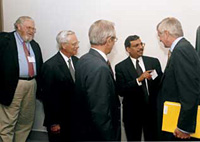 |
|
©2001
Kellogg/Thom Duncan
Kellogg Advisory Board members congratulate Dean Jain
after the announcement of his new position was made at
their spring meeting. |
|
| |
|
That's
very funny. Speaking of your early days at Kellogg, I understand
the circumstances surrounding your being hired were a bit
extraordinary. How did you come to Kellogg as a young professor?
The way
it works in academia is you get your PhD and you apply to
a number of schools. Most of the top schools in the U.S. invited
me, except Kellogg. I knew when I left Dallas for the interviews
at the American Marketing Association in Washington, D.C.,
that I was going to be meeting with a number of schools like
Stanford, Wharton, Harvard, MIT; everyone except Kellogg.
So I knew the one place where I cannot get a job was Kellogg.
Kellogg had interviewed some people from my university the
previous year and was not impressed by them. There were some
students from my university who had been previously interviewed
by Kellogg, and these students didn't enjoy the interview
at all. They told me horror stories about the interview process
at Kellogg. In my mind, then, I was thrilled that they didn't
call me, because had they called me I would have had to go
through this experience! So I said, that's fine, I'm not missing
anything.
I interviewed
with a small school from New York in the afternoon, and it
quickly became apparent that we were not made for each other.
I was doing pure mathematical research and this guy interviewing
me had no interest in what I was saying. After five minutes
he said why don't we change the topic? He asked where I was
from. I said India, so he said let's talk about Indian cooking.
But then he realized that I don't know how to cook so I had
little to contribute about Indian cooking. At that point we
decided to stop wasting each other's time and let me prepare
for my next interview. I went into the hotel corridor and
was just standing there and I saw a guy near an ashtray smoking
a cigarette. He was Prabha Sinha, a faculty member at Kellogg.
We all wore name badges and he saw mine. 'You are Dipak Jain,'
he said. 'I have heard very good things about you but I understand
you are not interviewing with us.' I said 'Yes, because I
never heard from you.' He told me that Kellogg tried to call
me for an interview but I had already left for Washington.
He asked me what I was doing right then. I explained that
I was waiting for my interview with the University of Chicago.
He told me to wait a minute and went into the room where his
Kellogg peers were interviewing another candidate. He brought
Andy Zoltners out into the hall and he and Andy talked to
me.
An
impromptu interview?
That's
right. Informal. They asked me what research I was doing and
I said heuristics. Andy and Prabha have mellowed down now,
but at that time they were quite rough in the sense that they
would ask real questions and not think it impolite to ask
them. Prabha says 'I don't believe what you're saying. Why
don't you just prove the theorem?' [laughs] He gives me a
pad and pencil. So I took the paper and in five minutes I
filled three pages. I'm sure he didn't know if it was right
or not, but at least he knew I knew how to write equations!
They then invited me for an on-campus interview. It all happened
that way. There was no planning.
That's
astonishing.
I knew
when I left for the conference that the one place I will not
get a job was Kellogg.
And
now you're the dean.
I could
never have imagined this. This is a true story, and the same
thing happened with Rajat Gupta at McKinsey. When he graduated
from Harvard he applied many places, and McKinsey rejected
him. One of his professors interceded and called someone at
McKinsey and said you are making a big mistake; give this
person an interview. They did, and Rajat got the job and eventually
became the CEO. I have to tell Rajat that I had exactly the
same experience as him.
Incredible.
See, we
all make mistakes when it--[looks at clock] I have to run
to teach my executive seminar!
At this
point, Dean Jain literally jumps out of his chair, grabs his
suit jacket and bolts down the hallway at the Allen Center,
returning to the teaching that he loves.
Sidenote:
Professor Jain recently returned to the classroom after five
years to teach a marketing research course. His students provided
him with ample proof that his skills remain as strong as ever:
They evaluated his effectiveness 9.9 out of a possible 10.
|





